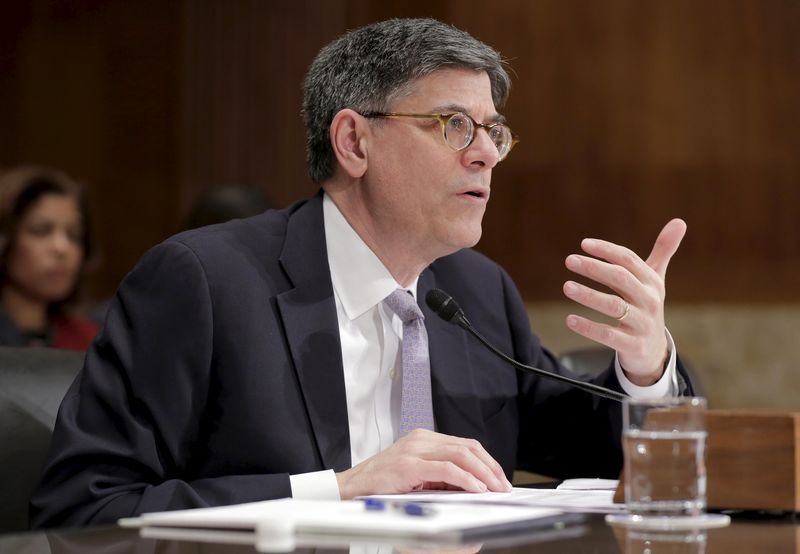By Lindsay Dunsmuir and Carl O'Donnell
WASHINGTON/NEW YORK (Reuters) - The U.S. Treasury Department took new steps on Monday to curb tax-avoiding corporate "inversions," with the pending $160 billion merger of Pfizer Inc (NYSE:PFE) and Allergan (NYSE:AGN_pa) Plc seen as a potential casualty.
The changes, less than a year before President Barack Obama ends his term, follow sharp political criticism of Pfizer's and Allergan's merger, which would be the largest inversion deal ever. While the rules did not single out this deal, one of the provisions takes aim directly at it.
Shares of Dublin-based Allergan fell 22 percent in after-market trading, while shares of New York-based Pfizer rose 3 percent.
The companies said they were reviewing the Treasury Department's notice. "Prior to completing any review, we won't speculate on any potential impact,” the companies said in a joint statement.
The federal government has grappled with a wave of inversions in recent years as U.S. companies have sought to slash their tax bills by redomiciling overseas, though their core operations and management usually remain in the United States even as they claim a new tax home. Several U.S. presidential candidates, including Republican Donald Trump and Democrat Hillary Clinton, have seized on the issue in their campaigns.
Obama, a Democrat, has called repeatedly for action by the Republican-controlled U.S. Congress on inversions, but lawmakers have done little. He repeated his appeal to Congress on Monday and said he welcomed the Treasury's action.
The Treasury said in a statement it will impose a three-year limit on foreign companies bulking up on U.S. assets to avoid ownership limits for a later inversion deal.
"In simple words, Allergan's key deals in the prior 36 months won't be counted (as far as meeting the inversion threshold is concerned) when doing the ownership math for the Pfizer-Allergan deal," Evercore analyst Umer Raffat wrote in a note.
These deals include the $66 billion merger of Allergan Plc and Actavis (NYSE:AGN) Plc, the $25 billion purchase of Forest Laboratories and the $5 billion takeover of Warner Chilcott.
"The real issue is not so much what Allergan may prove or disprove, or whether Treasury overstepped its authority. The real question is whether Pfizer reads today's regulations as reason enough to not continue to pursue the deal," Raffat wrote.
Under the agreement between Pfizer and Allergan, either party may terminate the deal if an adverse change in U.S. law would cause the combined company to be treated as a U.S. domestic corporation for federal income tax purposes. The terminating party would have to pay the other company up to $400 million for its expenses, according to the merger agreement.
LEW SAYS LEGISLATION STILL NEEDED
Treasury also said it is proposing rules to tackle a practice known as earnings stripping that is often undertaken following an inversion.
Earnings stripping covers a range of financial dealings that shrink the taxable U.S. profits of multinationals. A common strategy is to load up the U.S. unit of a redomiciled foreign company with debt and then shift U.S. profits to the new lower-tax foreign jurisdiction through interest payments.
The new Treasury rules would restrict related-party debt for U.S. subsidiaries in dealings that do not finance new investment in the United States. As part of these proposed regulations, the Internal Revenue Service would also be able to divide debt instruments into part debt and part equity, Treasury said.
Treasury Secretary Jack Lew said the new actions would "further rein in" inversions, while he repeated his call that only legislation in Congress could prevent such deals.
But at least one business group, the Organization for International Investment, which advocates for foreign-based companies, condemned the new rules.
"Treasury’s action would increase the cost of investing and expanding across the United States for all foreign companies and put at risk more than 12 million American workers that are supported by foreign direct investment in the United States," Nancy McLemon, the group's chief executive, said in a statement.
Such tax avoidance schemes have long been a thorn in Treasury's side. The proposed deal between Pfizer and Allergan, which would create the world's largest drugmaker, prompted renewed scrutiny.
Pfizer plans to redomicile in Ireland, where Allergan is based, and the companies expect to complete their merger in the second half of this year.
Last November, following the announcement of the Allergan-Pfizer deal, Treasury clamped down on inversions by limiting a U.S. acquirer's ability to set up a new foreign parent in a third country and to "stuff" assets into a foreign parent to meet post-inversion ownership limits.
On Treasury's latest steps, Senator Charles Schumer of New York, who has been a co-sponsor of legislation to curb inversions, said in a statement: "These regulations will make potential inverters and foreign acquirers think twice before making the leap, and those bad actors should be on notice that we intend to clamp down even further."
(This story has been refiled to correct syntax in headline. It was earlier refiled to add dropped word "Pfizer" in paragraph 3)
